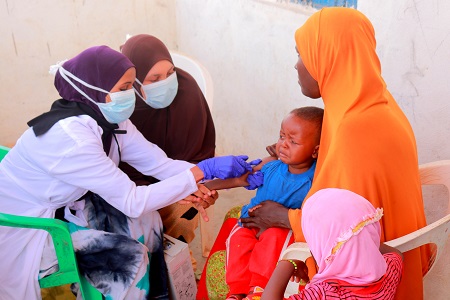
MOGADISHU, Aug 26 (NNN-Xinhua) — The World Health Organization (WHO) on Thursday launched a new project to prevent the community spread of COVID-19 across Somalia.
WHO Representative to Somalia Mamunur Rahman Malik said the project will address existing gaps in coordination, surveillance, vaccination, and the operational response to COVID-19 and help the country’s health system recover from the pandemic toward a more inclusive and equitable system.
Malik said in a statement issued in Mogadishu, the Somali capital, that the WHO in collaboration with partners including the Somali government will ramp up measures to contain and suppress the spread of COVID-19.
“This would prevent the resurgence of the virus. It would also minimize adverse effects of the pandemic on other life-saving essential health services, such as routine immunization for children, which has already slid back substantively in the last two years,” he added.
According to WHO, Somalia had 27,137 laboratory-confirmed COVID-19 cases, and 1,351 related deaths as of Wednesday and the country’s disease surveillance system remains fragmented and weak.
Currently, only 62 percent of health facilities in Somalia are reporting through the early warning and alert and response network, WHO said.
It also said the country could vaccinate only 15 percent of its population against COVID-19 fully, leaving many high-risk populations unvaccinated.
Malik said WHO will work to limit communities’ exposure to COVID-19 and reduce mortality and morbidity among vulnerable populations.
He said this will be accomplished by supporting the government and federal member states to maintain active surveillance for early case detection, laboratory confirmation, and contact tracing, and improve information and data sharing, including innovation and research.
According to WHO, an effective and robust response to COVID-19 outbreaks will be crucial to save lives, reduce the disease burden, and protect the general population’s health.
Somalia’s fragile health system has been struggling to sustain the progress made in containing and mitigating the transmission of COVID-19 among vulnerable populations, especially among around 47 percent of people who live in hard-to-reach areas, where disease reporting is weak and incomplete.
This results in underreporting and the actual magnitude and size of the COVID-19 epidemic in the country may not represent the true burden of the disease, the UN agency said. — NNN-XINHUA






